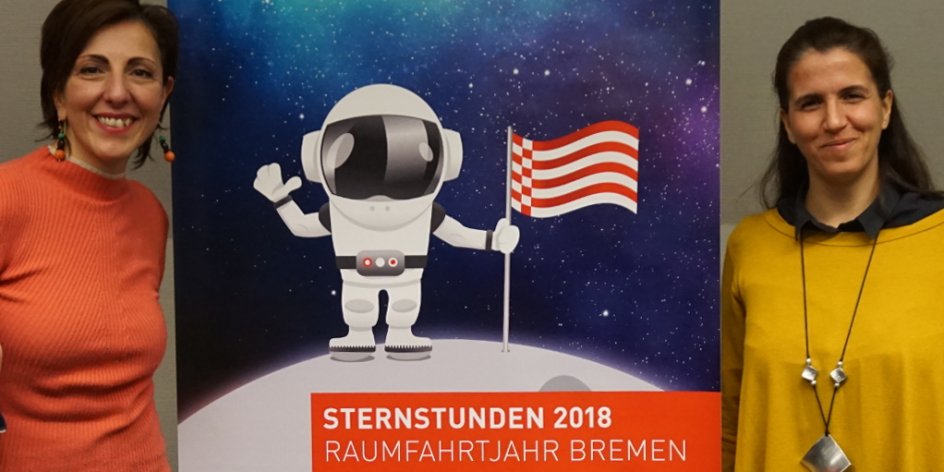
© WFB
The global network Women in Aerospace (WIA) aims to increase women’s leadership opportunities and visibility in space industry.
Women in Aerospace Europe (WIA-E) was founded in 2009 by Claudia Kessler and Simonetta di Pippo. The first local group was created in 2013: Women in Aerospace Bremen (WIA Bremen). We met the two engineers Antonella Sgambati und Michela Cantisani who work at OHB SE in Bremen and who are the coordinators of WIA Bremen.
With sparkle in the eyes and a refreshing smile on their lips, the two women are sitting opposite us, while Antonella’s seven-year-old son Tiziano draws pictures – of course space pictures, how could it be otherwise. One is right here to see.
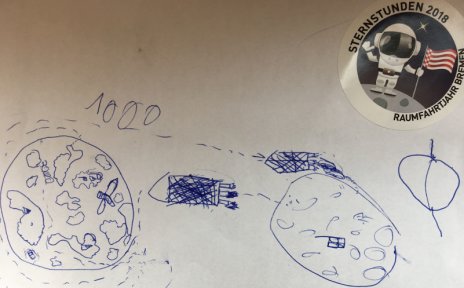
© WFB
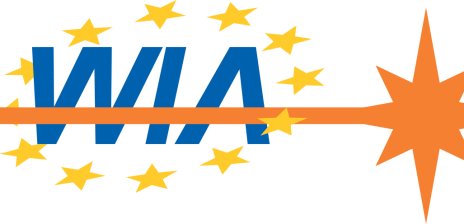
© Women in Aerospace
Antonella and Michela, in three words: What is Women in Aerospace?
Antonella: Networking, visibility, motivation.
Our big dream is to create a balance among women in all positions of the space industry in Europe. To achieve this goal, networks are very important to us: As a WIA member you have many opportunities to get in touch with people who have the same interests and similar perspectives, to interact with them and to gain inspiration and get visibility. We offer many benefits to our members. For example, we promote individual personal development through training or recognition through award ceremonies.
Michela: The entire organization is done on a volunteer basis by the specialists. This shows the great motivation behind WIA. It’s not a job you do because you have to do it. You get involved because you think there’s a gap that needs to be filled urgently. Both women and men can join us, everyone is welcome! We are all different, people and personalities with different daily workloads. But we have a common goal: Women can also become important personalities in space industry!
Your members are men and women as well?
Michela: Exactly. Everyone can become a member, whether you work in the space industry or just love the topic space. The priority is to pursue our common goal: to expand women’s opportunities for leadership positions in the space industry. WIA Bremen currently has 47 members, including men. We are all ambassadors and believe that thanks to our collaboration and a large network, we are getting closer to our goal and are also opening the women’s eyes.
Antonella: I would appreciate more feedback from our members after the events. We want to grow together and improve constantly. This is only possible with constructive criticism. Being a member is like a relationship. It’s built day by day.
You both are engineers. Tell us more about your careers. How did you get to space industry?
Michela: That’s a long story! I studied in Rome, where I come from. As part of my studies, I went to Toulouse with the Erasmus program. There I got in touch with CNES, the French space agency Center national d’études spatiales, where I also did an internship. After that I finished my Master studies and then I worked at CNES. As a space engineer, I even went to Kourou, the space port on the Atlantic coast of French Guiana, where satellites are launched. In Kourou I worked as "SAP loader facilities manager". We prepared the launch campaign for launching the satellite there. And now I'm working in Bremen as subcontractor manager for the Exomars project.
What has moved you to become a space engineer?
Michela: By chance, I would say. It was never the "dream of my life". I admit, I was always more interested in science subjects. In school I was better at it than in literature for example. But sooner or later, one is facing the big question: What now? I was always interested in the "behind". At school I went to Australia for one year as an exchange student. When you’re 17 years old and flying to the other side of the world, that’s a big deal and overwhelming. It was difficult for me at first, but that’s what gave me strength. I knew there is more! And that was it then. I decided to study space engineering and had the thought: You can do something special, something out of the ordinary. And now we are here.
Antonella: I’m also from Italy. I graduated as an aeronautical engineer with major in space. In fact, also by chance: I started with archaeological and paleontological studies. To discover or explore something has always been my goal! Then I became aware of aeronautical and maritime engineering and wanted to change my studies. So I called my mother and reported the idea. Her answer has been heard by many women already: "No! As a woman, you will later have problems bringing children and such a profession together. You will be away a lot and work full time. Now you can take the university career and work part time!" But I did not let that bother me. After my studies, space became my life. I lived in Turin, then ten years in Milan. There I met my husband; Tiziano was born there and became our motivator. After ten years in a place you rust. Through Tiziano I got a new perspective on the world. We were looking for new opportunities and are now working at OHB. Here in Bremen, I work among other things on the Alexander Gerst mission, on instrumental design or on 3D printing for the Moon Village. And the curiosity is still there.
Michela: Curiosity! That’s it! Never give up. It’s hard, to stay on track but very important. Like a child learning to walk. It falls, cries, but then gets up and tries again. At some point with success! The same applies to all steps in life. Everything is possible. The word impossible doesn’t exist.
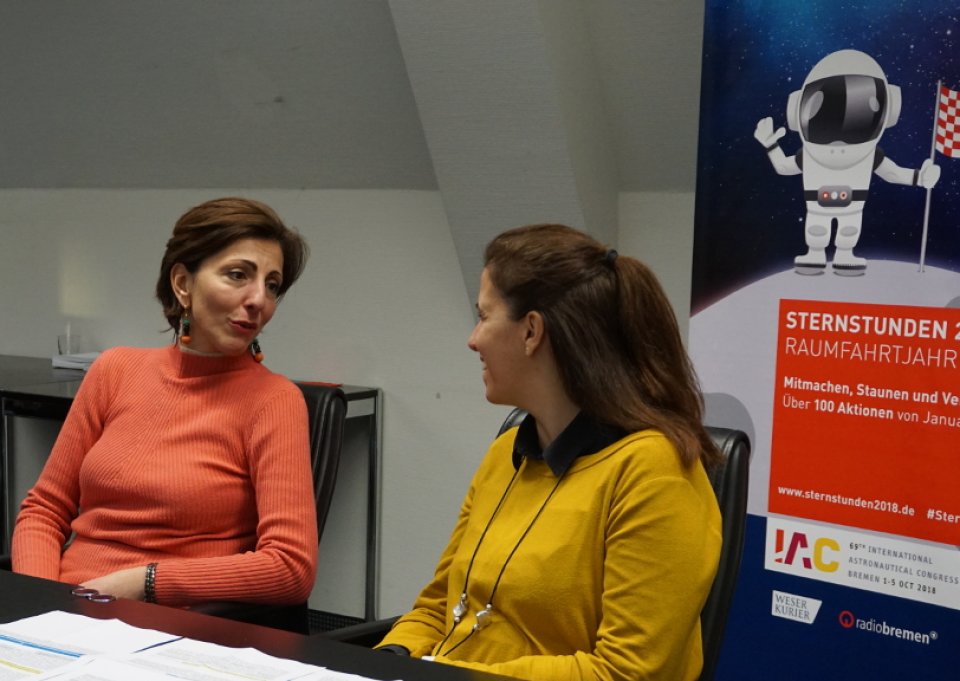
© WFB
To what extent is WIA Bremen in contact with other cities? Is there an exchange in the form of annual meetings, joint events or excursions and travel?
Antonella: There are annual meetings of the local group coordinators. This year, it’s in Darmstadt where Michela will participate and represent Bremen. At the meetings, we talk to the others about events, flyers, ideas. We also promote offers that can take place after the congress. We are planning a tram tour with a "party train", maybe with a ruffle. Two years ago - we were just half a year coordinators - we drove to Cologne and met WIA Cologne. There we visited the European Astronaut Center (EAC), even met an astronaut and visited :Envihab, a medical research facility that simulates, among other things, the effect of microgravity on the heart.
In Bremen, we then got our own tour through the greenhouse of EDEN: ISS , in which now Paul Zabel from the DLR Institute of Space Systems grows vegetables in the Antarctic. When we visited, we were allowed to try the first vegetables.
Michela: Being a member of WIA opens many doors and offers numerous possibilities: We visit places whose doors aren’t just open for tourists, e.g. you don’t meet an Astronaut every day!
One goal of WIA is to expand the opportunities of women in leadership positions and increase their visibility in the space industry by creating a network in Europe and worldwide. Where do you see potential for improvement?
Antonella: In culture.The same and equal awareness between man and woman has to be conveyed from the very beginning: even in kindergarten or primary school, gender are often separated, this must stop. Sometimes women don’t even apply for a job, giving up from the very beginning because they lack the motivation to take on the responsibility. The awareness, that there are ways to arrange work and life, with or without a child, must be created. Women are already managers. Their life is the project they lead!
Michela: In addition, more needs to be done within the companies. When it’s conveyed that women can achieve the same goals or positions as men, then everything becomes a bit easier. As Antonella said, it starts in everyday life. It’s also important that the politics take care of the "women topic" and convey the message that there are no limits, no barriers and that they shouldn’t be there. That’s fundamental. You do not become "space woman" by working in space. You become one when you’re still a child. And that’s why the equality of men and women has to be started there. You have to grow up with the message. Antonella, for example, is the only woman in her team.
Antonella: Yes, and in our studies we were only two women out of 150 students.
We conducted the interview in English and translated it in German. The German article can be found here.
Please note that the following content is in German.
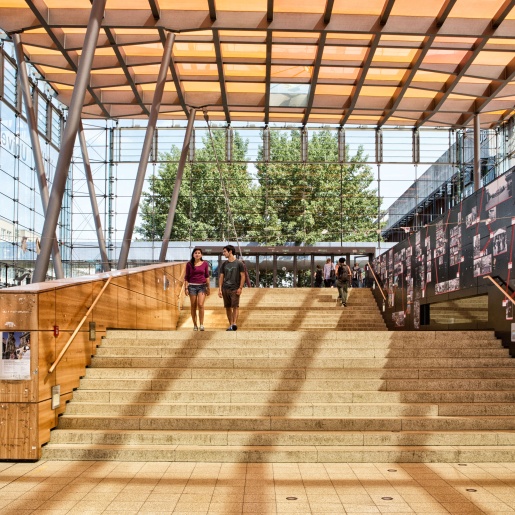
© WFB Wirtschaftsförderung Bremen GmbH/T. Vankann
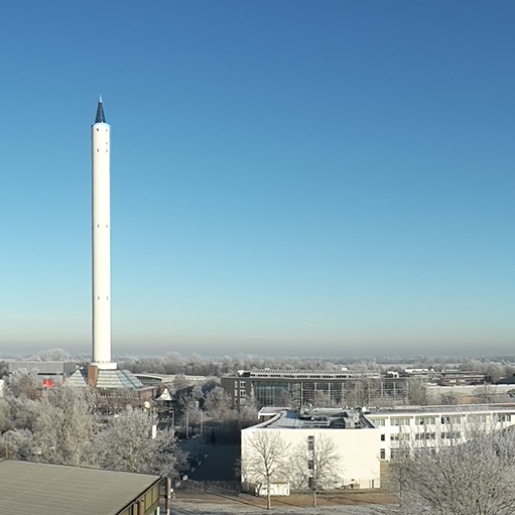
© ZARM, Universität Bremen